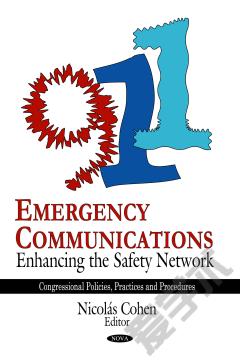Emergency Communications: Enhancing the Safety Network
Since September 11, 2001, several bills introduced in the U.S. Congress have included provisions to assist emergency communications. Legislation addressing communications among first responders focused first on interoperability - the capacity of different systems to connect - with provisions in the Homeland Security Act. The Intelligence Reform and Terrorism Prevention Act provided more comprehensive language that included requirements for developing a national approach to achieving interoperability. Future 911 systems will use Internet protocols (IP) to facilitate interoperability and system resilience, and to provide better connections between 911 call centers, emergency responders, and alert and warning systems, more robust capacity, and the flexibility to receive calls for help in any format. Congress may choose to revisit policy questions and support for 911 to assure that systems and networks are upgraded to become a fully functioning part of the United States' emergency communication safety net. This book explains the steps that are being taken by Congress to increase the safety network of emergency communication in the light of terrorist attacks.
{{comment.content}}








 京公网安备 11010802027623号
京公网安备 11010802027623号